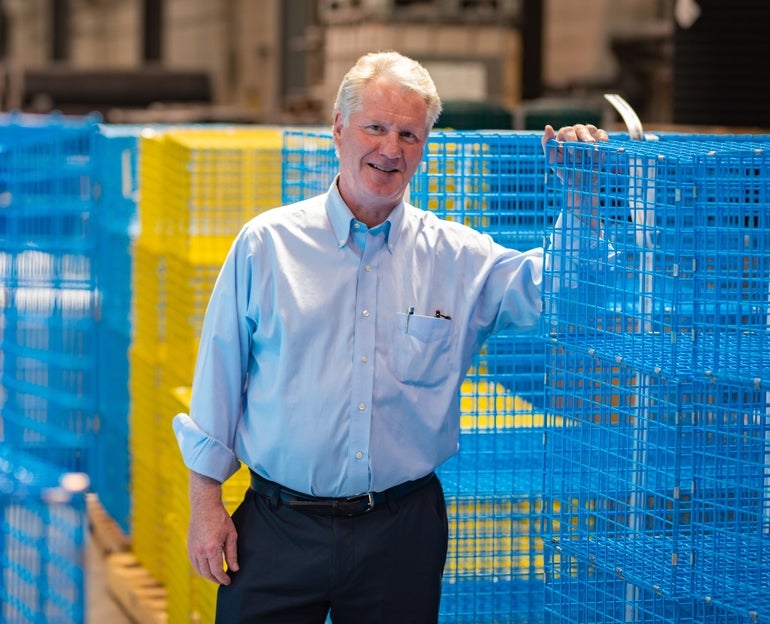Riverdale Mills Corp., tucked away on the Blackstone River in the Riverdale section of Northbridge, manufactures more than 3,500 sizes of welded wire mesh for marine, aquaculture, security, farming and construction industries. The company boasts nearly 400,000 square feet in a renovated facility it says previously forged bayonets for the Union Army in the Civil War. CEO Jim Knott spoke with WBJ about the company’s relationship to shellfishing, the search for skilled workers and what brought Riverdale Mills to Northbridge.
Is there a sector of the economy that you serve the most?
I’d say we’re No. 1 in the marine industry. We’re known globally for being probably the best producer of products that go into marine applications. Those are lobster traps, crab traps, oyster trays — there’s a lot of cultivation of oysters taking place these days. So, we’re well known for having a very cost-effective solution for high-corrosion subsea environments.
Is it true you have a special relationship to the lobstering industry?
My father had a patent on the first wire lobster trap back in the 1960s, I believe. From then, we started making wire mesh used to produce lobster traps. It started off slowly, where they were taking wire mesh, and they were nailing it onto the old wooden trap frame. Then sometime around 1980, we started producing the mesh, and they were making the complete trap out of wire mesh.
The reason why it’s very appealing for a lobsterman or a crab fisherman is it’s heavier in the water because it’s not made of wood, and it’s lighter on deck. The old traps used to have to be waterlogged in order to sink, so the fishermen would put a lot of bricks in them. They used to weigh between 70 and 120 pounds, whereas our traps are much lighter on the deck, more like 30 pounds.
How has COVID-19 impacted Riverdale beyond having to implement basic safety protocols for your staff?
We sell a lot of products globally, so we were talking to folks all over the world, and we were well aware that COVID was coming to the United States, probably before it arrived here in the magnitude which it did. We had a tremendous hit to our revenue line back in March, which lasted through July and August. Most of that business has come back. Right now, we’re hiring. We’re trying to staff three shifts 24/7, so we’re quite busy.
Why was Northbridge the right spot to start the company with your dad in 1979?
Originally, we were looking for some large manufacturing space. I was actually traveling through that area, saw the site and told my father about it. He bought the site. The site had the original mill on it, and about 70 acres, with it. It was also an economic target zone. Back in the 80s, they were trying to bring manufacturing back into that area because a lot of manufacturing had gone away.
Was finding a workforce easy enough at the time?
Whitin Machine Works was still running, but a portion of it had been shut down so there were skilled workers available to help us run our startup. The town was very welcoming because of it being an economic target zone, so it was a win-win for everybody at the time.
One of our difficulties now is getting labor there, because there’s no public transportation in Northbridge. That makes it a challenge to draw people from Worcester and Rhode Island and so forth, but we have quite a few people from all different areas.
What kind of positions are you hiring for right now?
We’re looking for a lot of shop floor help, so people who can run automatic welding machines. We’re also looking for some process engineers, electricians, skilled laborers.
Aside from hiring, what else are you focused on?
One of our things we want to focus on right now in terms of the future is getting digitized, even more modernized than we are right now. We’re highly automated at this point in time, probably more so than a lot of people in our industry. But what we want to do is take it one step further, so the machines actually learn to self-diagnose themselves. It makes it much easier to make products faster and of even higher quality.
This interview was conducted and edited for length and clarity by WBJ Staff Writer Monica Busch.

